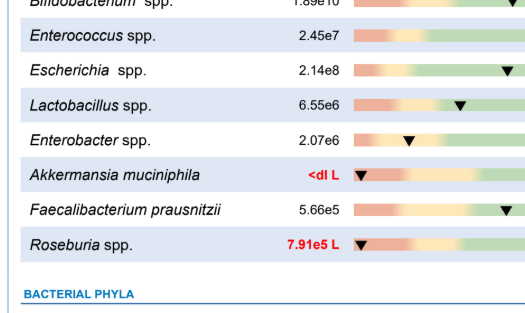Akkermansia and Cancer: How This Gut Bacteria Supports Chemo, Radiation, and Immunotherapy
Explore the science behind Akkermansia muciniphila—its role in cancer treatment, immune health, and how to support its function naturally.
Researched and written by Keith Bishop, Clinical Nutritionist, Cancer Coach, retired pharmacist, and founder of Prevail Over Cancer.
What is Akkermansia muciniphila?
Akkermansia muciniphila is a mucin-degrading bacterium that resides in the gut’s mucus layer. It plays a critical role in maintaining intestinal barrier integrity, improving immune responses, and influencing metabolic health. Its presence has been linked to improved outcomes in cancer therapy, metabolic disorders, and immune regulation.
A decline in Akkermansia muciniphila abundance correlated with the development of intestinal inflammation, colorectal cancer, and even cognitive disorders such as depression and anxiety.[i]
How Akkermansia Supports Cancer Treatments
- Akkermansia muciniphila and Chemotherapy: Enhancing Efficacy Through Microbial Synergy
Emerging evidence suggests that Akkermansia muciniphila may enhance the effectiveness of cancer chemotherapy by modulating immune responses, improving gut barrier integrity, and reducing treatment-related toxicity. A review published in Immuno-Oncology Technology outlines how Akkermansia promotes dendritic cell activation and T-cell priming, which can amplify the immunogenic effects of chemotherapeutic agents like cyclophosphamide.[ii]
Additionally, a 2022 Nature paper identifies a phospholipid from Akkermansia that activates TLR2–TLR1 signaling, contributing to homeostatic immune regulation and potentially supporting chemotherapy-induced tumor clearance Good morning.[iii] These findings underscore the potential of microbiome-informed strategies to optimize cancer treatment outcomes.
Caution. Akkermansia muciniphila may reduce the mucin barrier and exerts combined effects with other bacterial species in either promoting or inhibiting cancer development..[iv] A stool culture test, as discussed below, helps guide the decision of supplementation of probiotics.
- Akkermansia and Cancer Immunotherapy Boost
Patients with higher levels of Akkermansia show better responses to immune checkpoint inhibitors (e.g., anti–PD-1). It enhances antigen presentation and reduces immunotherapy-related side effects.[v]
- Akkermansia and Cancer Radiation Therapy: A Double-Edged Sword
While Akkermansia muciniphila is widely recognized for its gut-protective and immune-modulating properties, its role in radiation therapy is complex. On one hand, its ability to reinforce mucosal integrity and regulate inflammation may help buffer the gastrointestinal side effects of radiation, offering a potential therapeutic ally in maintaining gut resilience during treatment.[vi] [vii]
On the other hand, recent findings published in The ISME Journal caution that Akkermansia may exacerbate acute radiation-induced intestinal injury by depleting mucin and amplifying inflammatory responses in specific contexts.[viii]
These insights underscore the need for personalized microbiome strategies when integrating probiotics into radiation oncology protocols.

Click here to learn how to select quality supplements.
Other Health Benefits of Akkermansia
- Improved GLP-1 release and insulin sensitivity and reduced dyslipidemia[ix]
- Enhanced gut barrier function[x] and improved liver function[xi]
- Support for weight management and metabolic health[xii] [xiii] [xiv]
How to Increase Akkermansia Naturally
- Prebiotic fibers: Inulin, pectin, and polyphenols (e.g., cranberry, green tea)
- Intermittent fasting: Promotes mucin production, which feeds Akkermansia
- Avoid broad-spectrum antibiotics: These can deplete beneficial strains
- Resistant starches: Found in cooled potatoes, green bananas, and legumes
🧫 Microbiome Testing for Akkermansia
To assess Akkermansia levels with a stool culture, consider:
- GI-MAP by Diagnostic Solutions

- Thryve Inside (now Ombre)
- BiomeFx by Microbiome Labs
- uBiome
⚠️ Potential Concerns and Contraindications
- Radiation Risk: As noted, Akkermansia may worsen mucosal injury post-radiation
- Immunocompromised patients: Live supplementation should be approached cautiously
- Overgrowth: Excess mucin degradation may impair barrier function in specific contexts
💊 How to Supplement with Akkermansia
- Akkermansia Supplement at Fullscript
- Dosage: Typically 100–250 million CFUs/day, but clinical guidance is recommended
- Form: Capsules with delayed-release coating to survive gastric acid
Always consult a healthcare provider before starting supplementation, especially during active cancer treatment.
🧠 Final Thoughts
Akkermansia muciniphila is a promising ally in integrative oncology—but it’s not a one-size-fits-all solution. Its benefits in chemotherapy and immunotherapy are compelling, but caution is warranted in radiation contexts. With proper testing, dietary support, and clinical oversight, Akkermansia may become a cornerstone of microbiome-informed cancer care.
Addendum
Cancers Potentially Impacted by Low Akkermansia muciniphila Levels
As of the time of this blog’s publication (September 2025), only a limited number of cancers have been studied in relation to Akkermansia muciniphila. Most available research focuses on colorectal, breast, and gastrointestinal cancers, with emerging evidence suggesting that low levels of Akkermansia may correlate with poorer outcomes or increased risk. While findings are promising, further clinical studies are needed to clarify its role across a broader spectrum of malignancies.
Colorectal Cancer (CRC)
Low Akkermansia levels are linked to increased CRC risk and progression. A 2025 study demonstrated that Akkermansia metabolites suppress CRC cell proliferation via ferroptosis pathways.[i]
🅱️ Breast Cancer
While direct causality is still under investigation, microbiome imbalance—including reduced Akkermansia—has been observed in breast cancer patients. Its role in modulating estrogen metabolism and immune signaling may be relevant.[ii]
Gastrointestinal Cancers (General)
Akkermansia helps regulate the gastrointestinal microenvironment and mucosal immunity. Its depletion may contribute to tumor-promoting inflammation and barrier dysfunction across GI cancers.[iii]
[i] Han, Z., Zhang, ., Sun, H. et al. The mechanism of Akkermansia muciniphila inhibiting the proliferation of colorectal cancer cells via ferroptosis. Clin Transl Oncol (2025). https://doi.org/10.1007/s12094-025-03984-0
[ii] Druart C, Plovier H, Van Hul M, et al. Toxicological safety evaluation of pasteurized Akkermansia muciniphila. Journal of Applied Toxicology. 2020;41(2):276-290. doi: https://doi.org/10.1002/jat.4044
[iii] Wang, L., Tang, D. Akkermania muciniphila: a rising star in tumor immunology. Clin Transl Oncol 26, 2418–2430 (2024). https://doi.org/10.1007/s12094-024-03493-6
Akkermansia and Cancer Reference Sources
[i] Pellegrino, A., Coppola, G., Santopaolo, F., Gasbarrini, A., & Ponziani, F. R. (2023). Role of Akkermansia in Human Diseases: From Causation to Therapeutic Properties. Nutrients, 15(8), 1815. https://doi.org/10.3390/nu15081815
[ii] Chen, X., Li, Y., Wei, G., Zheng, Z., Liu, W., Li, M., Dai, X., Liu, B., Zhong, R., & Ye, J. (2025). The role of Akkermansia muciniphila in cancer: Mechanisms, therapeutic potential, and challenges. IMetaOmics, 2(2), e70010. https://doi.org/10.1002/imo2.70010
[iii] Bae M, Cassilly CD, Liu X, et al. Akkermansia muciniphila phospholipid induces homeostatic immune responses. Nature. 2022;608(7921):168-173. doi: https://doi.org/10.1038/s41586-022-04985-7
[iv] Gubernatorova, Ekaterina O., Ekaterina A. Gorshkova, Marina A. Bondareva, Olga A. Podosokorskaya, Anna D. Sheynova, Anastasia S. Yakovleva, Elizaveta A. Bonch‐Osmolovskaya, et al. 2023. “Akkermansia muciniphila ‐ Friend Or Foe in Colorectal Cancer?” Frontiers in Immunology 14: 1303795. https://doi.org/10.3389/fimmu.2023.1303795
[v] Fan, S., Jiang, Z., Zhang, Z. et al. Akkermansia muciniphila: a potential booster to improve the effectiveness of cancer immunotherapy. J Cancer Res Clin Oncol 149, 13477–13494 (2023). https://doi.org/10.1007/s00432-023-05199-8
[vi] Ge, Z., Chen, C., Chen, J., Jiang, Z., Chen, L., Wei, Y., Chen, H., He, L., Zou, Y., Long, X., Zhan, H., Wang, H., Wang, H., & Lu, Y. (2024). Gut Microbiota‐Derived 3‐Hydroxybutyrate Blocks GPR43‐Mediated IL6 Signaling to Ameliorate Radiation Proctopathy. Advanced Science, 11(28), 2306217. https://doi.org/10.1002/advs.202306217
[vii] He, Y., Lei, Y., Wu, H., Zhang, L., Li, Q., Li, T., Yin, T., Zhao, L., Liu, H., Xiang, Y., Zhu, J., Cui, Y., Wang, K., Wang, H., Lv, L., Sun, H., Liu, L., Xu, X., & Jian, P. (2023). Akkermansia muciniphila protects the intestine from irradiation-induced injury by secretion of propionic acid. Gut Microbes, 15(2), 2293312. https://doi.org/10.1080/19490976.2023.2293312
[viii] Wang, Y., Wang, X., Chen, Z., Zheng, J., Liu, X., Zheng, Y., Zheng, Z., Xu, Z., Zhang, Y., Chen, K., Zhang, Y., Yu, L., & Ding, Y. (2025). Akkermansia muciniphila exacerbates acute radiation–induced intestinal injury by depleting mucin and enhancing inflammation. The ISME Journal, 19(1). https://doi.org/10.1093/ismejo/wraf084
[ix] Arukha, A. P., Nayak, S., & Swain, D. M. (2025). Effect of Akkermansia muciniphila on GLP-1 and Insulin Secretion. Nutrients, 17(15), 2516. https://doi.org/10.3390/nu17152516
[x] Bae M, Cassilly CD, Liu X, et al. Akkermansia muciniphila phospholipid induces homeostatic immune responses. Nature. 2022;608(7921):168-173. doi: https://doi.org/10.1038/s41586-022-04985-7
[xi] Zhang, L., Qin, Q., Liu, M., Zhang, X., He, F., & Wang, G. (2018). Akkermansia muciniphila can reduce the damage of gluco/lipotoxicity, oxidative stress and inflammation, and normalize intestine microbiota in streptozotocin-induced diabetic rats. Pathogens and Disease, 76(4). https://doi.org/10.1093/femspd/fty028
[xii] Scheiman, J., Luber, J. M., Chavkin, T. A., MacDonald, T., Tung, A., Pham, L., Wibowo, M. C., Wurth, R. C., Punthambaker, S., Tierney, B. T., Yang, Z., Hattab, M. W., Clish, C. B., Lessard, S., Church, G. M., & Kostic, A. D. (2019). Meta-omics analysis of elite athletes identifies a performance-enhancing microbe that functions via lactate metabolism. Nature Medicine, 25(7), 1104-1109. https://doi.org/10.1038/s41591-019-0485-4
[xiii] Abbasi A, Bazzaz S, Cruz, et al. A Critical Review on Akkermansia muciniphila: Functional Mechanisms, Technological Challenges, and Safety Issues. Probiotics and Antimicrobial Proteins. Published online July 11, 2023. doi: https://doi.org/10.1007/s12602-023-10118-x
[xiv] Fujisaka, S., Watanabe, Y., Toume, K. et al. Identification of herbal drug extracts that promote growth of Akkermansia muciniphila in high-fat diet fed mice. Diabetol Int 15, 495–506 (2024). https://doi.org/10.1007/s13340-024-00713-w




